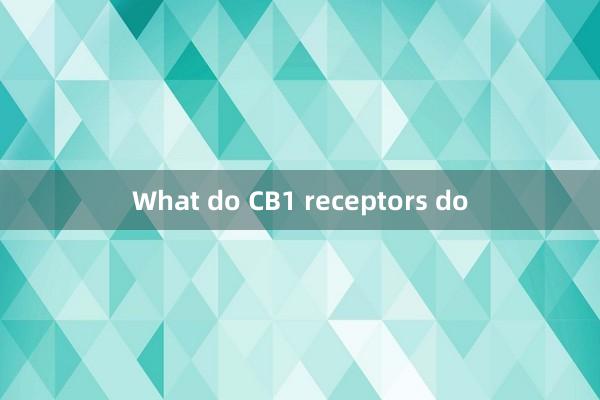

The CB1 receptor, a critical component of the endocannabinoid system, plays an essential role in maintaining balance within the body. This receptor, primarily found in the central nervous system, impacts numerous physiological and psychological functions, making it a significant focus in medical and scientific research. To understand its importance, we must delve into its mechanisms, functions, and potential therapeutic applications.
CB1 receptors are one of two primary cannabinoid receptors, the other being CB2. These receptors are part of the endocannabinoid system, a complex cell-signaling network that regulates various bodily processes. CB1 receptors are predominantly located in the brain and spinal cord, though they are also present in peripheral tissues.
The receptors interact with endocannabinoids, which are naturally occurring compounds in the body. Additionally, they bind to cannabinoids found in cannabis, bongdalu fun such as THC (tetrahydrocannabinol). This interaction is responsible for many of the psychoactive effects associated with cannabis consumption.
CB1 receptors influence a broad spectrum of functions, bw777 ranging from mood and appetite to memory and pain perception. Below are some of their most notable roles:
Regulation of Mood and Emotions CB1 receptors are heavily concentrated in areas of the brain involved in emotional processing,200jili such as the amygdala and prefrontal cortex. By modulating neurotransmitters like serotonin and dopamine, these receptors can affect mood, anxiety, and overall emotional stability. This has implications for understanding and potentially treating mood disorders such as depression and anxiety.
Appetite and Metabolism One of the most well-known effects of CB1 receptor activation is the stimulation of appetite, often referred to as the "munchies." This occurs because CB1 receptors in the hypothalamus regulate hunger signals and energy balance. These properties are being explored in treatments for conditions like anorexia and cachexia.
Pain Management CB1 receptors play a pivotal role in the perception of pain. By interacting with the central nervous system, they can reduce pain signals, providing relief in conditions like neuropathy and chronic pain disorders. This has fueled interest in cannabinoids as potential analgesic agents.
Memory and Cognition The receptors are abundant in the hippocampus, a brain region essential for memory and learning. While short-term activation of CB1 receptors can impair memory, researchers are investigating how modulating these receptors could have therapeutic benefits in neurodegenerative diseases like Alzheimer’s.
Motor Control CB1 receptors are found in areas of the brain responsible for movement, such as the basal ganglia and cerebellum. Their influence on motor coordination and control has implications for treating movement disorders like Parkinson's disease.
Given their involvement in such diverse functions, CB1 receptors are a promising target for therapeutic interventions. Here are some areas where CB1-focused treatments show potential:
Neurological Disorders: By modulating CB1 receptor activity, scientists aim to develop treatments for epilepsy, multiple sclerosis, and other neurological conditions.
Psychiatric Conditions: The receptors’ role in mood regulation makes them a target for anxiety and depression therapies.
Chronic Pain: Cannabinoid-based treatments that act on CB1 receptors could provide pain relief without the side effects associated with traditional painkillers.
Obesity and Metabolic Disorders: Blocking CB1 receptors in peripheral tissues is being explored as a strategy to reduce obesity and related metabolic issues without affecting the central nervous system.
Despite their potential, targeting CB1 receptors is not without challenges. Overactivation of these receptors, such as through excessive cannabis use, can lead to side effects like memory impairment, addiction, and mental health issues. Developing treatments that selectively target specific CB1 receptor pathways is a key focus of ongoing research to minimize such risks.
Additionally, individual differences in the endocannabinoid system complicate therapeutic approaches. What works for one person may not be effective for another, necessitating personalized treatment strategies.
CB1 receptors are integral to many physiological processes, influencing everything from mood to metabolism. Their role in maintaining homeostasis highlights their importance in health and disease. While challenges remain, the potential for CB1-targeted therapies is immense. Continued research into these receptors promises not only to enhance our understanding of human biology but also to unlock innovative treatments for a range of medical conditions.